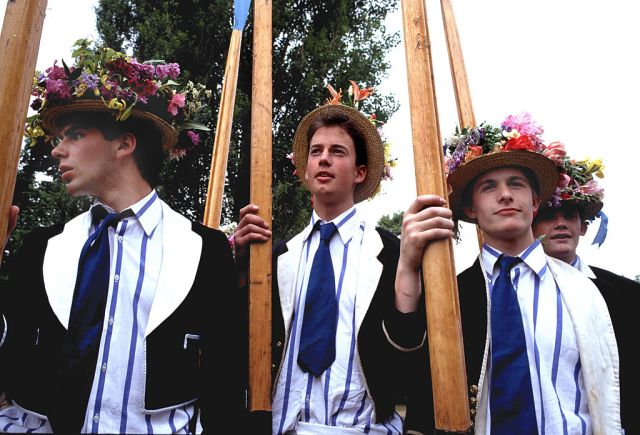There’s a row going on down near Slough. Photo by Tom Stoddart/Getty Images

I was an Eton rebel once, though not a very convinced or convincing one. Back in the early 1970s, alongside all our personal psychodramas, we rebels were driven (I think) by a sense of the absurdity of our self-consciously patrician institution, with all its flummery of language and clothing. In a pre-democratic era — with a quasi-hereditary ruling class that required training to run a country and an empire — it made some sense, but in the egalitarian, post-imperial age of the Beatles and Labour governments? It seemed ridiculous.
So our rebellion, to the extent that it wasn’t just about smoking grass and listening to the Grateful Dead, tended to be about class and class guilt. Like Malcolm McDowell in the 1968 public school revolution fantasy film if…., we were on the Left. We spoke with mockney accents; one of my friends became a skinhead and slipped away to Stamford Bridge every other Saturday.
Today’s elite public school radicalism is a very different animal. The schools no longer think of themselves as conservative institutions training a ruling class to preserve a national heritage — they are now academic forcing houses attracting and producing a global elite of the “brightest and best”. They think of themselves as academic meritocracies, albeit with a bias towards the affluent, and are often in the vanguard of the most fashionable pedagogical and social trends.
Contemporary race- and gender- based progressivism is therefore no threat at all to the people running the schools, indeed it is positively welcomed by them. One can observe this in the kerfuffle surrounding the Eton master who has been sacked for explaining, and at least partially defending, the concept of patriarchy — it was the Eton authorities who intervened, not an uprising of radical pupils, and some parents and pupils have actually been protesting against the sacking. But in my experience of speaking at London private day schools and knowing plenty of young people who have emerged from them in recent years, progressive groupthink is the norm.
I recently stumbled across an example of this in the alumni magazine of St Paul’s, another elite private school. It featured an interview with former pupil Jonah Freud, who has recently launched a petition to “Decolonise St Paul’s” that has been signed by more than 1,000 current and former students. The letter calls for “educating through a global, rather than eurocentric, curriculum” and “deconstructing the racist fabric of our society”. Jonah, who studied Race and Pop Music at the NYU Gallatin School of Individualised Study, is the son of Matthew Freud, grandson of Clement, himself the grandson of Sigmund. Interviewer Tom Adeyoola writes of the moment Freud was awakened:
“For someone already ‘woke’ it was something closer to home that compelled him to action in writing to St Paul’s; the similarity between the names of George Floyd and his older brother George Freud. In his own words, ‘I have never experienced anything of the fear that George Floyd’s family would have feared and the only reason for that is that I am white.'”
I don’t want to sound cynical about this; it is obviously a welcome development that young men and women, many of whom will graduate to important jobs in our society, have egalitarian instincts and are aware of their privileges. But what about the most important privilege of all: their parents’ wealth? It is rather morally convenient for them to believe passionately in every kind of equality except economic equality.
Perhaps at some unconscious level the elite progressive public school authorities and pupils feel they will get a free pass for their huge financial advantages, if only they shout loudly enough about how they are challenging all other kinds. And as the conformist young progressives agonise about their white privilege it is rather handy that this places them in the same boat as lower income white people in struggling post-industrial towns. If both groups are primarily privileged by their race, the heads of Eton and St Paul’s can with a clear conscience complain about anti-public school bias when Oxford and Cambridge colleges try to raise their quota of people from such low income backgrounds.
“If you are a citizen of the world, you are a citizen of nowhere,” said Theresa May in 2017. It was a clumsily expressed sentiment. But isn’t this exactly what she was talking about? A financial and educational elite, including significant sections of big business, who are increasingly disconnected from the feelings and interests of the rest of the country yet regard themselves as leading the struggle for human progress.
Shaun Bailey, the Tory London mayoral candidate, talks about tackling black disadvantage and widening access to the elite as a means of strengthening the national “team”. This is the kind of language that people of all races can happily support; but a worrying aspect of the BLM protests earlier in the year was how it divided the country, between a big section of the white elite — who embraced it enthusiastically — and the white provincial majority who seemed to be looking on with some scepticism.
Surely, if elite public schools do have any justification in a modern liberal democracy, it is precisely that the people who run them are teaching their privileged pupils to think clearly, honestly and independently about social (and other) problems, not egging them on to embrace the latest fashionable cause. As the greatest of 20th century Etonians, George Orwell, put it: “If liberty means anything at all, it means the right to tell people what they do not want to hear.”










Join the discussion
Join like minded readers that support our journalism by becoming a paid subscriber
To join the discussion in the comments, become a paid subscriber.
Join like minded readers that support our journalism, read unlimited articles and enjoy other subscriber-only benefits.
Subscribe